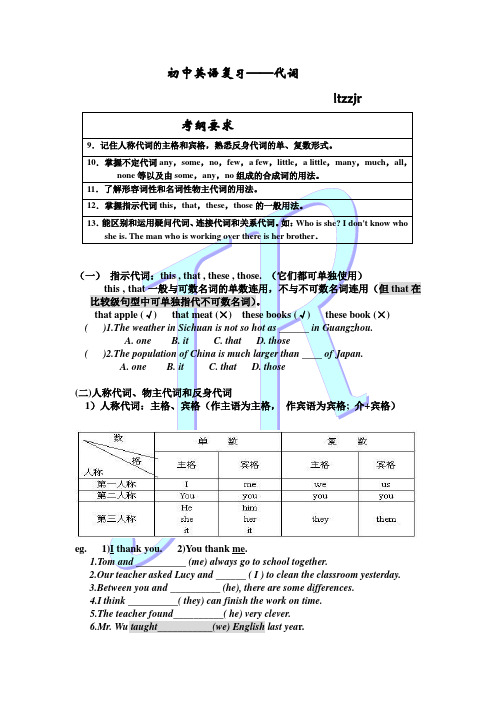初中英语代词复习
- 格式:ppt
- 大小:464.00 KB
- 文档页数:39

★初中代词★代词: 代换名词、形容词等词语的词1.人称代词顺口溜:人称代词有两类,一类主格一类宾;主格代词本领大,一切动作由它发;宾格代词不动脑,介动之后跟着跑。
2.物主代词顺口溜:物主代词不示弱,带着‘白勺’来捣乱;形容词性物主代,抓住名词不放松;最后只剩名词性,海阔天空任它走。
人称代词的用法1. 人称代词的五种基本形式:2. 人称代词的基本用法:1、人称代词的主格在句子中作主语或主语补语。
一般在句首,动词前。
例如:John waited a while but eventually he went home.约翰等了一会儿,最后他回家了。
John hoped the passenger would be Mary and indeed it was she.约翰希望那位乘客是玛丽,还真是她。
说明:在复合句中,如果主句和从句主语相同,代词主语要用在从句中,名词主语用在主句中。
在电话用语中常用主格。
例如:When he arrived, John went straight to the bank.约翰一到就直接去银行了。
I wish to speak to Mary. This is she.我想和玛丽通话,我就是玛丽。
2、人称代词的宾格在句中作宾语或表语,在动词或介词后。
例如:Do you know him?(作宾语) 你认识他吗?Who is knocking at the door?It’s me. (作表语)是谁在敲门?是我。
说明:单独使用的人称代词通常用宾格,即使它代表主语时也是如此。
例如:I like English. Me too.我喜欢英语。
我也喜欢。
3、注意:在动词be 或to be 后的人称代词视其前面的名词或代词而定。
例如:I thought it was she.我以为是她。
(主格----主格)I thought it to be her.(宾格----宾格)I was taken to be she.我被当成了她。


初中英语语法梳理和提高---代词总结与精讲(含答案)代词知识梳理:提纲挈领,抓住重点和难点!一、代词的分类英语中常把代词分为人称代词、无主代词、反身代词、指示代词、疑问代词、连接代词、不定代词和相互代词。
二、代词的用法1.人称代词:人称代词是指人的代词,有性、数、格的区别。
表示“我” “你” “他” “我们” “你们” “他们”。
请看下表:(1)(2)宾格在句中作宾语。
例如:They don’t want me to go there alone.Don’t worry. I can lo ok after her.(3)宾格还可以作宾格。
特别是在口语中。
例如:--- Who’s that? --- It’s me.注意:①人称代词we, you, they 可以用来表示一般人。
例如:You cannot go into the hall with slippers. 不准穿拖鞋进入大厅。
②人称代的主格作表语,一般都在正中的谈话中,表示强调。
例如:It was he who took away the necklace. 是他拿走了那条项链。
③人称代词she可以用指代祖国、大地、月亮、轮船等。
例如:The ship is leaving. She’s on her first trip to Boston. 轮船要起航了。
这时她第一次去波士顿。
We love our country, we hope she’ll be stronger and stronger. 我们热爱我们的祖国,我们希望她越来越强大。
④It作为人称代词时,可以表示天气、距离、时间、环境等。
例如:It is about 10 kilometres from here. 离这儿大约有10公里。
⑤It 还可用作形式主语或形式宾语,来代替由不定式,动词的-ing,形式或主语从句构成的真正的主语或宾语,以避免句子头重脚轻。
例如:It is not easy to learn English well.It is good for you taking a walk after supper.I found it difficult to sleep.⑥英语里当主语是并列的几个人时,人称代词的排列顺序和汉语不同,I 在最后,you 在最前;但是,当受到批评或时承认错误时正好相反,I 在最前,you在最后。

初中英语复习——代词ltzzjr(3.Between you and __________ (he), there are some differences.4.I think __________( they) can finish the work on time.5.The teacher found__________( he) very clever.6.Mr. Wu taught___________(we) English last yea r.it的用法:A.基本用法(代替前边所提到的事物的单数或不可数名词)This is my new bike. I like_____ very much.I like this kind of bread. ______ is delicious.Look at the dog! ______is playing with a cat.B.代替上文的指示代词this/that.e.g, --What’s this? --______ is a dictionary.--Is that an elephant? --Yes, _____ is.C.代替不明身份的人或婴儿.e.g, --Who’s that? --______ is Mike.(电话或敲门声)Look at the baby! ______ is only three months old.D.表示时间,季节,距离或天气.e.g, --What’s the time? -- _____two o’clock._____ is autumn now.--What’s th e weather like today? --____ is windy.______ is a long way from Anyue to Beijing.How far is_______ from Longtai to Anyue?E.代替动词不定式,作形式主语或宾语。


人称、物主、反身代词知识精讲一、代词的概念1. 定义:代词是代替名词的一种词类。
大多数代词具有名词和形容词的功能。
2. 分类:英语中的代词,按其意义、特征及在句中的作用分为:人称代词、物主代词、反身代词、指示代词、疑问代词、关系代词和不定代词等。
二、人称代词1. 人称代词定义:表示“我,你,他,她,它,我们,你们,他们”的词叫做人称代词。
人称代词分主格和宾格两类,有单、复数之分。
如:We are the best. 我们是最棒的。
Please give us more time to finish it.请给我们更多的时间来完成它。
2. 人称代词形式:3. 人称代词的用法:1). 主格:做主语。
如:You are good students. 你们是好学生。
2). 宾格:做宾语。
I love you. 我爱你。
如:She is looking at you.她正在看你。
3). 人称代词的语序:当几个人称代词并列充当主语时,单数形式(二、三、一)You, he and I复数形式(一、二、三)We, you and they第三人称男女两性并用时,男先女后He and she4). it 的用法:(1). 指前文提到过的事物。
如:This isn’t my book. It’s Dufu’s.这不是我的书。
它是杜福的。
(2). 指代时间/季节/天气/距离。
如:Which season is it? 现在是什么季节?It’s spring now. 现在是春天。
What’s the weather like today? 今天天气怎样?It’s hot. 今天很热。
How far is it? 那里有多远?It’s 10 kilometers. 10千米。
(3). 特殊句型It’s time to do sth. 该做......的时间了如:It’s time to go to bed. 该睡觉了。
代词定义名词的替身人称代词:解决“谁”的问题我你他她它他们我们你们主格I you he she it they we you 宾格me you him her it them us you 使用规则:主格:作主语,动词前;宾格:动词后,介词后(不一定做宾语)人称问题第一人称:我I 我们we第二人称:你you 你们you第三人称:他/她/它he/she/it 他们they人称排序单数:二,三,一(你为尊,他第二,我垫后)You, he and I go to the library together.复数:一,二,三(单调复不调)We, you and they go to the library together.物主代词:解决“谁的”的问题类型我的你的他的她的它的他们的我们的你们的形容词性物主代词My your his her its their our your名词性物主代词mine yours his hers its their ours yours使用规则:形物代+名词=名物代(必然不加名词)反身代词:解决“谁自己”的问题人称第一人称第二人称第三人称反身代词myself ourselves yourself yourselves himself herself itself themselves 含义我自己我们自己你自己你们自己他自己她自己它自己他们自己1.使用规则:反身代词使用时在人称、性别、数上保持一致2.常用词组:1. (by )oneself 独自=on one’s own2. enjoy oneself 玩得高兴,过得愉快3. help oneself .... 请自用……(随便吃/喝些……).4. look after oneself=take care of oneself 照顾自己5. say to oneself 自言自语6. make oneself at home 不要约束7. introduce oneself 介绍……自己8. teach oneself 自学=learn sth by oneself9. dress oneself 打扮注意:反身代词不能单独做主语,但可以做主语的同位语,起强调作用。
代词知识点详解(初中英语专项复习)一、人称代词人称代词主要是指代人和物的代词。
有人称、数和格的变化。
1.人称代词的句法作用(1)人称代词作主语Eg: We will go shopping this weekend.She is my best friend.(2)人称代词作宾语Eg: It took him five days to finish the task.They don’t believe me.(3)人称代词作介词的宾语Eg: When I’m in trouble, I always talk with her.The actor is so handsome that everyone looks at him.(4)人称代词作表语Eg: ---Who is knocking the door?---It’s me.2.人称代词的用法(1)人称代词we, you, they除了指一定的人以外,有时还用来泛指人们,指言者、听者或第三方Eg: We are not born for ourselves.You can’t trust a man who always breaks his promise.If they say you’re good, ask yourself if it be true.(2)两个或多个代词作主语时,为表示礼貌,I应放在最后Eg: You and I are required to work together.(3)人称代词it的用法①代替动植物或无生命的事物Eg: I’ve had this bike for 3 years. My father bought it for me.Fish lives under water. It swims with its tail.②代替婴儿Eg: The baby fell down on the ground. It must be hurt.③代替前面提到的事物Eg:---Thanks for your help.---Don’t mention it.④代替this或thatEg: ---What’s this?---It’s a ruler.二、物主代词物主代词表示所属关系,包括形容词性物主代词和名词性物主代词,有人称和数的变化,单1.物主代词的句法作用(1)形容词性物主代词:相当于于形容词,置于名词前,作定语。
代词一、人称代词:谁----who/whom主格I you he she it we you they宾格me you him her it us you them 主格做主语;宾格做宾语二、物主代词:谁的----whose形物代my your his her its our your their 名物代mine yours his hers its ours yours theirs 形物代后必须接名词;名物代后不需接名词三、反身代词:谁自己反myself yourself himself herself itself ourselves yourselves themselves 四、指示代词:this这,这个●指离得近的单数名词●打电话用语,介绍自己用this is...●介绍别人,用this is...that那,那个●指离得远的单数名词/不可数名词●打电话用语,询问对方用who’s that...?●指代前文提到的人或物(同类异物表特指)these这些●指离得近的复数名词those 那些●指离得远的复数名词●指代前文提到的人或物(同类异物表特指)注意:用指示代词问,要用人称代词回答Eg:Is this your pen?Yes,it is./No,it isn’t.Are these your pens?Yes,they are./No,they aren’t.五、相互代词:彼此,互相each other=one another彼此,互相each other’s=one another’s彼此的,互相的六、疑问词:疑问代词和疑问副词疑问代词:what (主语、宾语)什么which (主语、宾语)哪一个;哪一些who (主语、宾语)谁whom (宾语)谁(宾格)whose (定语)谁的what/which+n. (主语、宾语)什么....../哪个...... what与who问人的区别:What:询问人的职业Who: 询问人的身份What与which问事物的区别:What: 未知范围What animal do you like best?Which:已知范围Which season do you like best?疑问副词:when (时间状语)什么时候where (地点状语)哪里why (原因状语)为什么How (方式状语)如何;怎样how+adj./advHow many+可名复How much+不可名How heavy/old/tall....How often 对频率提问How soon 对in+一段时间提问(将来时标志)How long 对(时间/物体)长度提问How far 对距离提问(常与from...to...搭配使用)七、连接代词:引导宾语从句that无意义在从句中不充当成分从句表达陈述含义If/whether是否在从句中不充当成分从句表达一般疑问含义或选择疑问含义疑问词有意义在从句中充当成分从句表达特殊疑问含义八、关系代词:引导定语从句关系代词:that,who,whom,whose,which先行词关系代词在从句中所做成分人/物that主语/宾语人who主语/宾语人whom宾语人/物whose定语物which主语/宾语关系副词:when,where,why先行词关系副词在从句中所做成分时间when=介词+which时间状语地点where=介词+which地点状语reason why=for+which原因状语九、不定代词:●many/much●some/any●every/eachevery强调整体大于等于三不能用of连用只能做定语each强调个体大于等于二可以与of连用可以做主语,宾语,定语,同位语every+数词+名词每隔...Eg: We pay a visit to our grandparents every two weeks.We each have a dictionary.=Each of us has a dictionary.●no+n.=not+a/an/any+n.●两者三者或以上both all都... (谓语动词用复数)either any...之一(谓语动词用单三)neither none都不...(谓语动词用单三)●few/a few/little/a little● a bit=a little=a little bit +adj./adva bit of=a little +不可数名词●not a bit=not at all 根本不,一点也不not a little=very much 很,非常●the other(+可名单)特指两者中的另一个another(+可名单)泛指三者或以上的另一个the other+可名复特指其他所有的other+可名复泛指其他一些the others不加名词特指其他所有的=the other+可名复others不加名词泛指其他一些=other+可名复another+数词+可名复=数词+more+可名复额外的●nothing/no one/noneno thing什么都没有用what提问no one=no body没有人用who提问none一个都没有用how many/how much提问●it--they/them同类同物one--ones同类异物(表泛指)that--those同类异物(表特指,多用于比较)●Eg:The weather in Guangzhou is hotter than that in Harbin in summer●复合不定代词/不定副词something someone somebody somewhere anything anyone anybody anywhere everything everyone everybody everywhere nothing no one nobody nowhere1.adj.修饰复合不定代词时,adj后置。
中考英语代词知识点总复习代词是用来替代名词的词,能够简化句子结构并避免重复使用名词。
中考英语中常见的代词包括人称代词、指示代词、反身代词、不定代词和相对代词等。
以下是这些代词的常见知识点总结:1. 人称代词(Personal Pronouns):- 主格: I, you, he, she, it, we, they- 宾格: me, you, him, her, it, us, them- 形容词性物主代词: my, your, his, her, its, our, their- 名词性物主代词: mine, yours, his, hers, its, ours, theirs - 反身代词: myself, yourself, himself, herself, itself, ourselves, yourselves, themselves2. 指示代词(Demonstrative Pronouns):- this, that, these, those3. 反身代词(Reflexive Pronouns):- myself, yourself, himself, herself, itself, ourselves, yourselves, themselves4. 不定代词(Indefinite Pronouns):- all, another, any, anybody, anyone, anything, both, each, either, everybody, everyone, everything, few, many, neither,nobody, none, no one, nothing, one, other, some, somebody, someone, something5. 相对代词(Relative Pronouns):- who, whom, whose, which, that需要注意的是,代词在句子中的作用和所代替的名词之间的关系要清楚、准确。